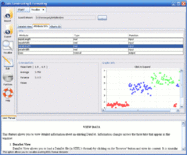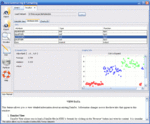KEEL
Knowledge Extraction based on Evolutionary Learning 1.0 (2014/01/29)
Developed by: Spanish National Projects
License: GPL / GNU General Public License
Web page : Tool homepage
Tool type : Application software
The last edition of this page was on: 2014/02/27
The Completion level of this page is : Low
The last edition of this page was on: 2014/02/27 The Completion level of this page is : Low
SHORT DESCRIPTION
[[has description::KEEL (Knowledge Extraction based on Evolutionary Learning) is an open source (GPLv3) Java software tool which empowers the user to assess the behavior of evolutionary learning and Soft Computing based techniques for different kinds of DM problems: regression, classification, clustering, pattern mining and so on.
See a complete description on KEEP website]]
TOOL CHARACTERISTICS
Usability
Tool orientation
Data mining type
Manipulation type
IMPORT FORMAT :
EXPORT FORMAT :
| Tool objective(s) in the field of Learning Sciences | |
|
☑ Analysis & Visualisation of data |
☑ Providing feedback for supporting instructors: |
Tool can perform:
- Data extraction of type:
- Transformation of type: Simple data transformation operations, Mathematical transformation of data for analysis
- Data analysis of type: Data mining methods and algorithms, Basic statistics and data summarization
- Data visualisation of type: (These visualisations can be interactive and updated in "real time")
ABOUT USERS
Tool is suitable for:
Required skills:
STATISTICS: N/A
PROGRAMMING: N/A
SYSTEM ADMINISTRATION: N/A
DATA MINING MODELS: N/A
FREE TEXT
| Tool version : Knowledge Extraction based on Evolutionary Learning 1.0 2014/01/29 (blank line) Developed by : Spanish National Projects | 
|
SHORT DESCRIPTION
KEEL (Knowledge Extraction based on Evolutionary Learning) is an open source (GPLv3) Java software tool which empowers the user to assess the behavior of evolutionary learning and Soft Computing based techniques for different kinds of DM problems: regression, classification, clustering, pattern mining and so on.
See a complete description on KEEP website
TOOL CHARACTERISTICS
| Tool orientation | Data mining type | Usability |
|---|---|---|
| This tool is designed for general purpose analysis. | This tool is designed for Structured data mining. | Authors of this page consider that this tool is . |
| Data import format | Data export format |
|---|---|
| . | . |
| Tool objective(s) in the field of Learning Sciences | |
|
☑ Analysis & Visualisation of data |
☑ Providing feedback for supporting instructors: |
Can perform data extraction of type:
Can perform data transformation of type:
Simple data transformation operations, Mathematical transformation of data for analysis
Can perform data analysis of type:
Data mining methods and algorithms, Basic statistics and data summarization
Can perform data visualisation of type:
(These visualisations can be interactive and updated in "real time")
ABOUT USER
| Tool is suitable for: | ||||
| Students/Learners/Consumers:☑ | Teachers/Tutors/Managers:☑ | Researchers:☑ | Organisations/Institutions/Firms:☑ | Others:☑ |
| Required skills: | |||
| Statistics: | Programming: | System administration: | Data mining models: |
OTHER TOOL INFORMATION

|
| Keel screenshot.gif |
| Keel logo.jpg |
| Knowledge Extraction based on Evolutionary Learning |
| GPL / GNU General Public License |
| Free&Open source |
| Spanish National Projects |
| 2014/01/29 |
| 1.0 |
| http://sci2s.ugr.es/keel/download.php |
| [[has description::KEEL (Knowledge Extraction based on Evolutionary Learning) is an open source (GPLv3) Java software tool which empowers the user to assess the behavior of evolutionary learning and Soft Computing based techniques for different kinds of DM problems: regression, classification, clustering, pattern mining and so on.
See a complete description on KEEP website]] |
| General analysis |
| N/A |
| N/A |
| N/A |
| N/A |
| Application software |
| Structured data mining |
| Data transformation, Data analysis, Data visualisation |
| Data mining methods and algorithms, Basic statistics and data summarization |
| Simple data transformation operations, Mathematical transformation of data for analysis |
| Low |

